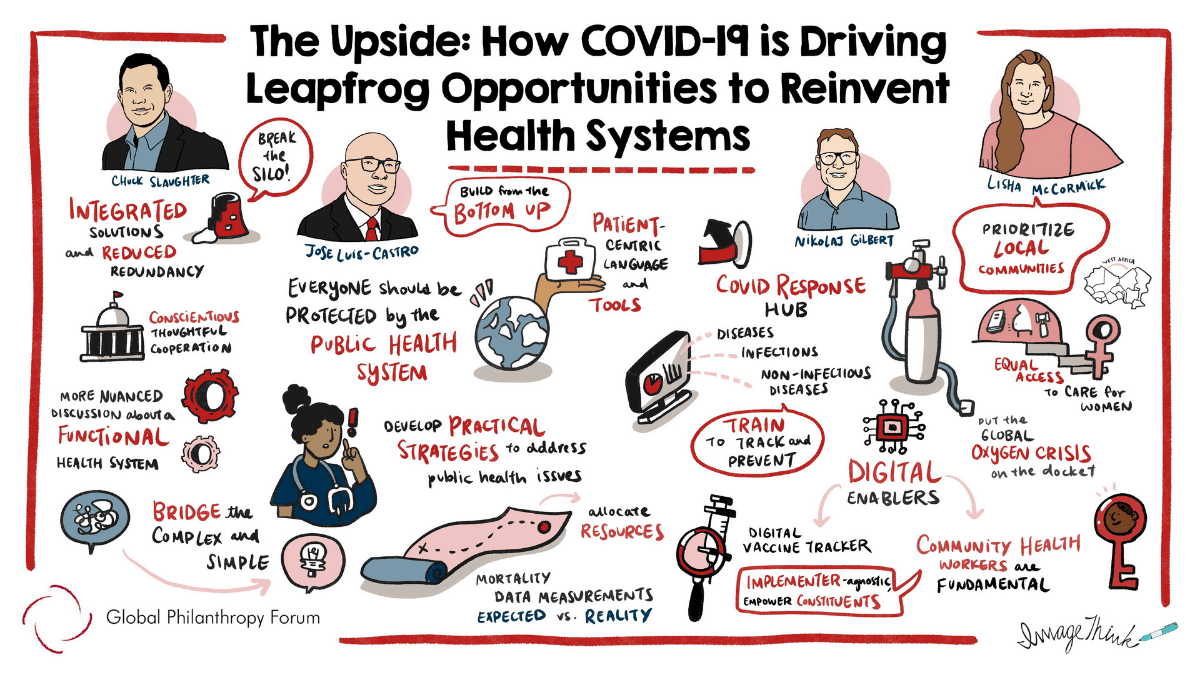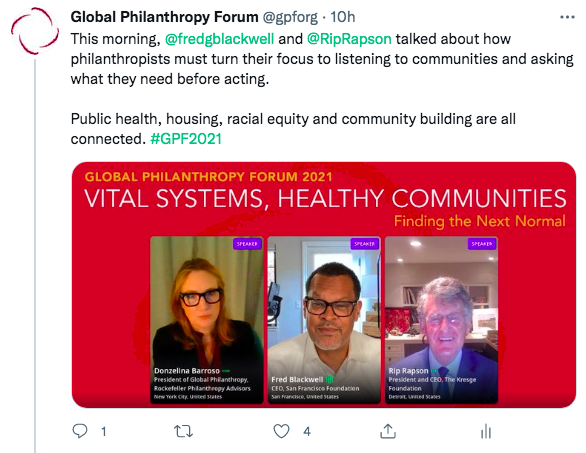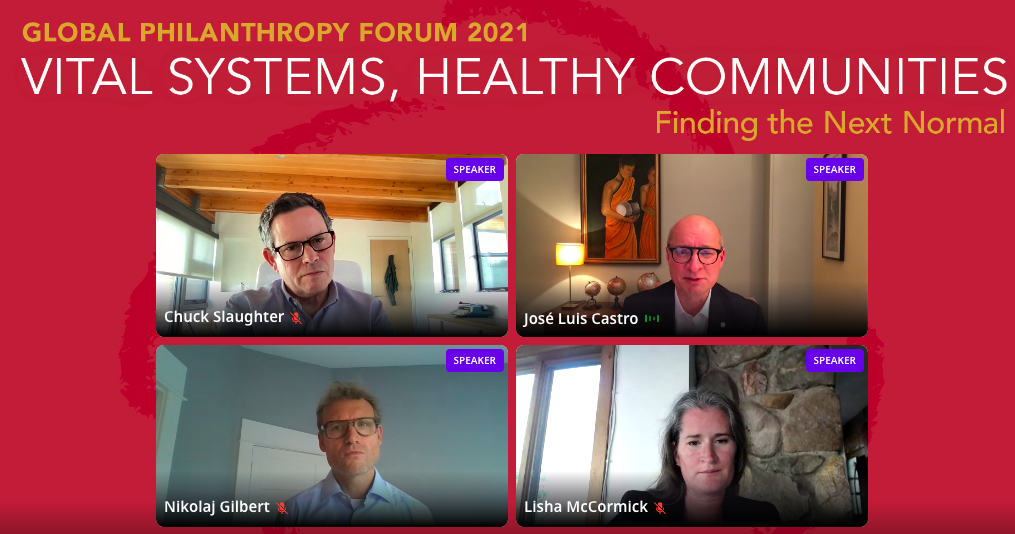
Each year the GPF community gathers to present new ideas, share insights and ultimately spur action. GPF 2021 is no exception; but it just so happens to be taking place during a time that is extraordinary in almost every respect. In a world that has long been in the midst of rapid technological, social and political change the COVID-19 pandemic has been an action-forcing event like no other in recent memory.
So, as we begin the search yet again for the “next normal” in the post-COVID era, Philip Yun, CEO of World Affairs, started day one of GPF by asking everyone to take a collective deep breath, recall how far we have come but also be mindful of what we have painfully experienced the past 18 months.
Sir Mark Malloch Brown, CEO of Open Societies Foundation, stressed that the COVID-19 pandemic has only deepened and accelerated the global trends that already existed. In short, the world is more unequal, more authoritarian. Geopolitically over the last decade or more, the forces of nationalism have been winning out over those advocating for internationalism or multilateralism. The pandemic in 2020 has simply laid bare the astonishing levels of inequality in our societies, not only of treatment but also of access. He concluded that soundbite leadership cannot provide the answers needed for the extra-national challenges we face. What we are experiencing is a global public health crisis and a political and economic one.
There have been times in the past when multilateral institutions have worked well in partnership with the private sector and the development community, for example in tackling the AIDS crisis. This can happen again, but only if we remain truly committed to global solutions. This takes leadership. Malloch Brown urged us all not to get complacent as COVID-19 recedes in the United States and other developed nations. “Unless we are all safe, no one is safe.”
While many in the philanthropic sector have taken up the call to action and reacted quickly to the emergent necessities of the pandemic, there is a general sense that philanthropy has failed in fundamental ways to protect the most vulnerable. Donzelina Barroso, President of Global Philanthropy at Rockefeller Philanthropy Advisors, in conversation with Fred Blackwell, CEO of the San Francisco Foundation, and Rip Rapson, President and CEO of the Kresge Foundation, focused on how much the world has changed and the reckoning it has brought for the philanthropic sector. With a crisis of this magnitude that has impacted every corner of the globe in myriad ways, philanthropists cannot help but look at how their past successes are measured. Both Blackwell and Rapson asked, “what do we need to do better and, more importantly, who with?” Community based foundations like theirs were able to pivot quickly, rapidly distributing resources to trusted community leaders and organizations that in turn, were able to focus on meeting basic needs of individuals. But each acknowledged that a strategic shift does not always come easily. To be true to their communities, foundations must listen more to those they seek to serve, and not only hear them but trust them. Fred Blackwell noted that, “We are facing two viruses, COVID-19 and Racism-20, one attacked the body and the other the spirit, and we cannot let either win.”

After COVID-19 and the reckoning with racism, the nature of the challenge may have changed and strategic philanthropy along with it, permanently. Philanthropy should not revert to previous modes but adapt to the next normal. Blackwell argued that on the one hand, “it is important to actually do the work rather than just talk about it,” and on the other hand, “we need to slow down; act with urgency but not haste.”
Working groups offered an opportunity to take a deeper dive into innovative ways that philanthropy responded around the world – in Brazil and in Africa for example. Another group focused on building healthy communities and the importance of dealing with consequences of the pandemic for mental health and social isolation, while another group discussed how to safeguard women’s health and combat gender-based violence.
In the second half of the day, Chuck Slaughter, founder of Living Goods, led a conversation on how COVID-19 is driving opportunities to reinvent health systems. Acknowledging the pandemic’s challenges, like the disparity between high-income countries and the rest of the world when it comes to vaccine access, Lisha McCormick, CEO of Last Mile Health, Nicolaj Gilbert, President and CEO of PATH, and José Luis Castro, President and CEO of Vital Strategies, discussed the opportunity to fix broken health systems and use digital tools to address inequity – especially for children’s and women’s access to healthcare.
Since just returning to the United States from Liberia, what makes Lisha McCormick hopeful is seeing how strengthening primary health systems and the community health work force has helped prepare communities to better manage the response to the pandemic. Nicolaj Gilbert found this to be true in the Democratic Republic of Congo where an emergency center to handle the Ebola outbreak was transformed into a COVID response hub.
The global nature of the crisis also forced advances that can be used in the future. For example, the critical need for widespread emergency medical care revealed that there was no way to know the oxygen capacity for a given country when the global oxygen shortage hit. So, a tool to monitor countries oxygen supply was developed.
José Luis Castro noted that if we are to support our partners in the public health system, we must make it simple for them to do their work. As we reimagine public health, we need to simplify regulations and remove obstacles.
Asked how philanthropic initiatives can better serve community-based organizations that are reimagining public health, McCormick advised “in your grantmaking, ask what’s being done to be inclusive and work with local organizations. Ask if some of the funding requirements you have are exclusionary to smaller community groups."

Concluding the day, Jennifer Albone, Consultant to the World Bank Education Practice, talked with Alice Albright, CEO of Global Partnership for Education and Angeline Murimirwa, Executive Director – Africa at CAMFED, about ensuring access to education to maximize potential, especially for girls and the most vulnerable children.
When nations realized that COVID-19 was gravely serious, schools were the first to close their doors and 1.6 billion children were suddenly not at school; a crisis never experienced before. Today, 60 million children around the world are still affected by school closures.
To respond, Albright described the repurposing of grant funds to support education at home. Many solutions were low tech, like distributing materials where online access was unavailable. Murimirwa noted how Covid laid bare inequalities that were already there, especially in education. CAMFED responded by identifying families in need and ensuring they had basic supplies, and using innovative ways to deliver curriculum, like WhatsApp.
On the individual level, Murimirwa noted that girl’s education is the ground from which leadership springs, and barriers preventing girls from going to school must be addressed. On a global, systemic level, Albright noted there has been huge progress for girls in recent decades, but it’s been too slow and fragmented. At this rate, gender equality will only be reached in 100 years. This is too long. Even today in Chad, only one in eight women can read and write. We will not make progress on so many other issues if we have girls lagging.
So, what can philanthropy do? Albright believes champions are needed to have seismic impact - what the Gates Foundation did for health, we need for girl’s education. Murimirwa added that if you want to support women’s leadership – invest in people who have experienced the problem. Invest in reaching the most marginalized – if you take care of the most marginalized it benefits everyone.

